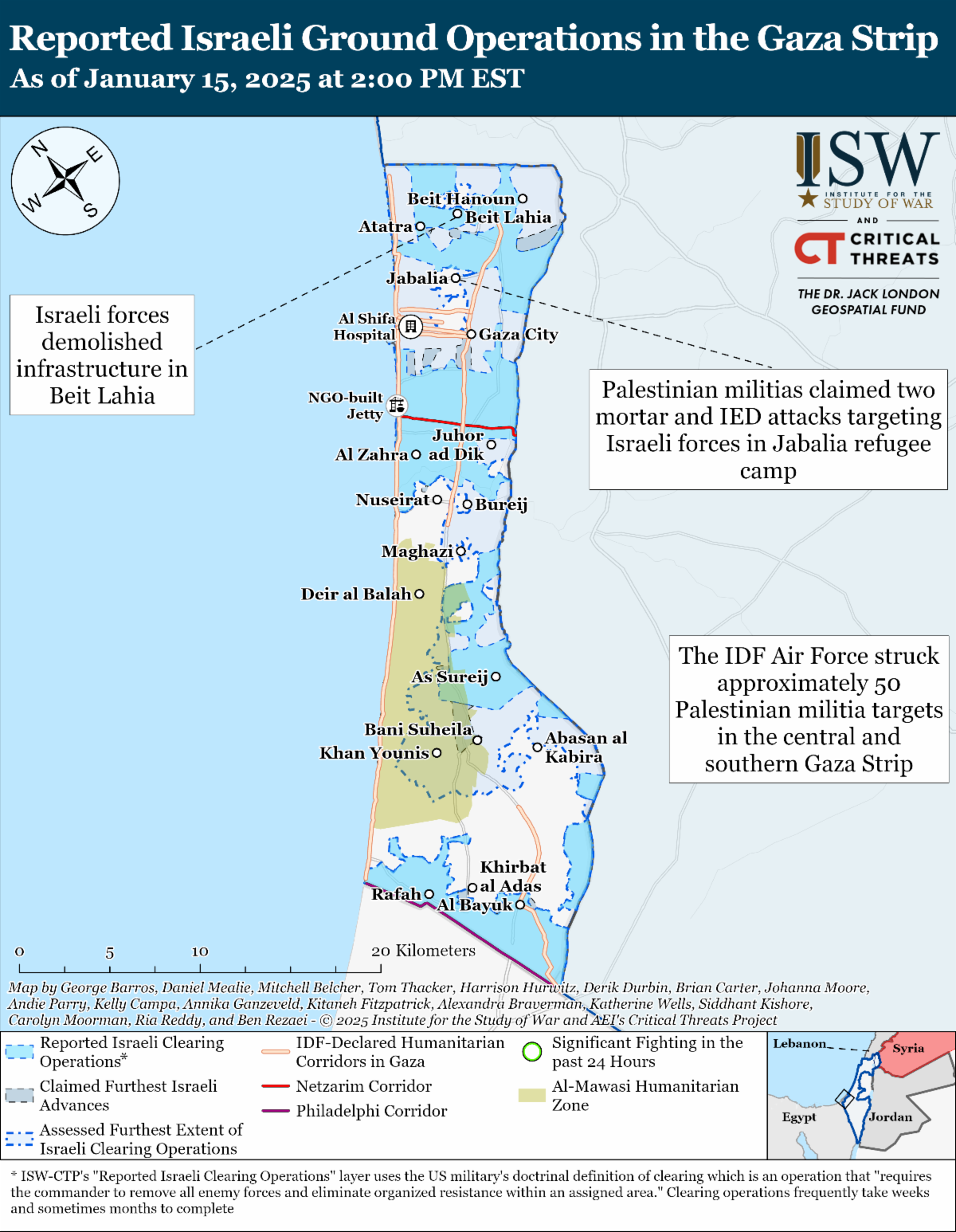Israel and Hamas approved a ceasefire-hostage agreement on January 15. Qatari Prime Minister Mohammed bin Abdulrahman al Thani announced that mediators from the United States, Qatar, and Egypt will monitor the ceasefire, which will take effect on January 19. Hamas confirmed that it agreed to the final draft agreement on January 15. The agreement outlines three phases, as proposed by US President Joe Biden in May 2024. During the first phase, which will last for 42 days beginning on January 19, Hamas must release 33 hostages. The Israel Defense Forces (IDF) will gradually withdraw from the central Gaza Strip to an 800-meter-deep buffer zone along the Gaza Strip’s eastern and northern boundaries during the first phase. Reuters reported that “Israel will release 30 Palestinian prisoners for every Israeli civilian and 50 Palestinian prisoners for every female Israeli soldier that Hamas releases.” Israel will also allow displaced Gazans to return to the northern Gaza Strip during this phase. Israel and Hamas will begin negotiations on the 16th day of the ceasefire to secure the release of the remaining Israeli hostages, a complete IDF withdrawal from the Gaza Strip, and a permanent ceasefire. This presumably means that if negotiations for the second phase of the ceasefire fail, the fighting would resume. The third phase of the ceasefire reportedly includes provisions for the reconstruction of the Gaza Strip supervised by Egypt, Qatar, and the United Nations.
Hamas appears to have agreed to allow the IDF to remain in the Philadelphi Corridor, an operationally and strategically significant IDF-held area in the southern Gaza Strip, during at least the first phase of the ceasefire. The withdrawal of the IDF from the Philadelphi Corridor was a major point of contention between Israel and Hamas during the ceasefire talks. Israeli Prime Minister Benjamin Netanyahu’s office announced on January 15 that Hamas "backed down" on its demand for an IDF withdrawal from the corridor "at the last minute."
Key Takeaways:
- Gaza Strip Ceasefire: Israel and Hamas approved a ceasefire-hostage agreement on January 15. Qatari Prime Minister Mohammed bin Abdulrahman al Thani announced that mediators from the United States, Qatar, and Egypt will monitor the ceasefire, which will take effect on January 19. Hamas appears to have agreed to allow the IDF to remain in the Philadelphi Corridor, an operationally and strategically significant IDF-held area in the southern Gaza Strip, during at least the first phase of the ceasefire.
- Iraqi Parliamentary Politics: A large number of Iraqi political parties boycotted parliament on January 15, likely to demonstrate their ability to rally sufficient support to block parliament. The Iraqi Parliament Speaker and his allies, including the United Sunni Leadership Coalition, may also have deliberately blocked the General Amnesty Law in order to block the passage of the Intelligence Service Law, which was also on the agenda.
- Syria-Turkey Meeting: Syrian interim government officials met with senior Turkish defense officials in Ankara on January 15, likely to discuss military coordination as well as Hayat Tahrir al Sham (HTS) and Turkish efforts to coerce the US-backed Syrian Democratic Forces (SDF) to disarm. The Syrian delegation in Ankara also likely briefed Turkish officials on the progress of their negotiations with the SDF. The SDF has continued to push back against HTS demands for its disarmament and integration into the Syrian Defense Ministry.
| 





 [ISW] 이란 업데이트, 2025년 1월 19일
[ISW] 이란 업데이트, 2025년 1월 19일
 [ISW] 이란 업데이트, 2025년 1월 13일
[ISW] 이란 업데이트, 2025년 1월 13일